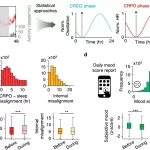Researchers uncover a concerning link between stress and perceived age among younger adults, highlighting the impact of stress on mental and physical well-being. The findings shed light on the importance of interventions to mitigate stress and promote a sense of control over one’s life.
A groundbreaking study led by Shevaun Neupert, a professor of psychology at North Carolina State University, has unearthed a concerning phenomenon: younger adults, when under stress, report feeling and looking older, especially on days when they perceive a lack of control over their lives.
The study, published in the Journal of Gerontology: Psychological Sciences, challenges the notion that stress-induced aging effects are confined to older adults. Instead, it underscores the pervasive influence of stress across all age groups, with potentially far-reaching implications for mental and physical health.
Neupert and her team collected data from 107 younger adults aged between 18 and 36, conducting a baseline survey followed by detailed daily assessments over eight consecutive days. Participants reported their daily stress levels, perceived control over their lives, and subjective age perception — how old they felt and looked.
The pivotal finding revealed a correlation between heightened stress levels and an increased sense of age, but only when coupled with a perception of diminished control. Neupert emphasized the relative nature of these measures, highlighting that even modest deviations from individuals’ typical stress and control levels yielded noticeable effects on perceived age.
“This study sheds light on a previously overlooked aspect of stress research, particularly in younger adults,” Neupert remarked. “The impact of stress on age perception underscores the importance of addressing stress and empowering individuals with a sense of control over their lives.”
The study’s relevance extends beyond theoretical insights, as Neupert noted the contemporary context of escalating stress levels among younger generations. With mounting societal pressures and unprecedented challenges, understanding the interplay between stress, control, and perceived age becomes increasingly pertinent.
“Chronic stress poses significant health risks over time, and younger adults are not immune to its effects,” Neupert cautioned. “As this generation grapples with historically high stress levels, proactive measures are essential to safeguard their mental and physical well-being.”
The findings underscore the urgency of implementing targeted interventions to mitigate stress and cultivate resilience among younger adults. By addressing stressors and fostering a sense of control, researchers aim to mitigate the adverse effects of stress-induced aging perceptions, paving the way for healthier, more vibrant futures.
As stress continues to exert its influence across age groups, the study serves as a clarion call for holistic approaches to mental health and underscores the imperative of empowering individuals to navigate life’s challenges with resilience and confidence.










